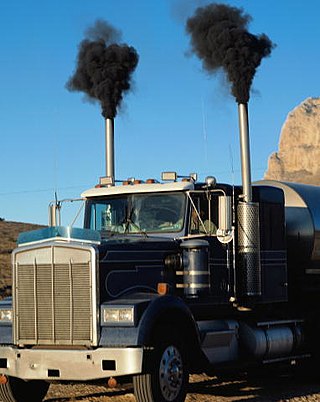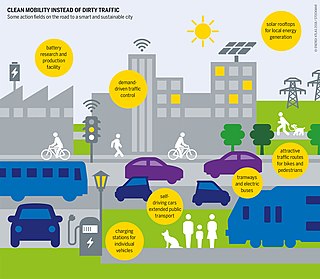Related Research Articles

An electric vehicle (EV) is a vehicle that uses one or more electric motors for propulsion. It can be powered by a collector system, with electricity from extravehicular sources, or it can be powered autonomously by a battery. EVs include, but are not limited to, road and rail vehicles, surface and underwater vessels, electric aircraft, and electric spacecraft. For road vehicles, together with other emerging automotive technologies such as autonomous driving, connected vehicles, and shared mobility, EVs form a future mobility vision called Connected, Autonomous, Shared, and Electric (CASE) Mobility.

Fuel efficiency is a form of thermal efficiency, meaning the ratio of effort to result of a process that converts chemical potential energy contained in a carrier (fuel) into kinetic energy or work. Overall fuel efficiency may vary per device, which in turn may vary per application, and this spectrum of variance is often illustrated as a continuous energy profile. Non-transportation applications, such as industry, benefit from increased fuel efficiency, especially fossil fuel power plants or industries dealing with combustion, such as ammonia production during the Haber process.

Alternative fuels, also known as non-conventional and advanced fuels, are fuels derived from sources other than petroleum. Alternative fuels include gaseous fossil fuels like propane, natural gas, methane, and ammonia; biofuels like biodiesel, bioalcohol, and refuse-derived fuel; and other renewable fuels like hydrogen and electricity.

A zero-emission vehicle, or ZEV, is a vehicle that does not emit exhaust gas or other pollutants from the onboard source of power. The California definition also adds that this includes under any and all possible operational modes and conditions. This is because under cold-start conditions for example, internal combustion engines tend to produce the maximum amount of pollutants. In a number of countries and states, transport is cited as the main source of greenhouse gases (GHG) and other pollutants. The desire to reduce this is thus politically strong.

Julia Elizabeth King, Baroness Brown of Cambridge, is a British engineer and a crossbench member of the House of Lords, where she chairs the Select Committee on Science and Technology. She is the incumbent chair of the Carbon Trust and the Henry Royce Institute, and was the vice-chancellor of Aston University from 2006 to 2016.

Exhaust gas or flue gas is emitted as a result of the combustion of fuels such as natural gas, gasoline (petrol), diesel fuel, fuel oil, biodiesel blends, or coal. According to the type of engine, it is discharged into the atmosphere through an exhaust pipe, flue gas stack, or propelling nozzle. It often disperses downwind in a pattern called an exhaust plume.
The United Kingdom's Climate Change Programme was launched in November 2000 by the British government in response to its commitment agreed at the 1992 United Nations Conference on Environment and Development (UNCED). The 2000 programme was updated in March 2006 following a review launched in September 2004.

Sustainable transport refers to ways of transportation that are sustainable in terms of their social and environmental impacts. Components for evaluating sustainability include the particular vehicles used for road, water or air transport; the source of energy; and the infrastructure used to accommodate the transport. Transport operations and logistics as well as transit-oriented development are also involved in evaluation. Transportation sustainability is largely being measured by transportation system effectiveness and efficiency as well as the environmental and climate impacts of the system. Transport systems have significant impacts on the environment, accounting for between 20% and 25% of world energy consumption and carbon dioxide emissions. The majority of the emissions, almost 97%, came from direct burning of fossil fuels. In 2019, about 95% of the fuel came from fossil sources. The main source of greenhouse gas emissions in the European Union is transportation. In 2019 it contributes to about 31% of global emissions and 24% of emissions in the EU. In addition, up to the COVID-19 pandemic, emissions have only increased in this one sector. Greenhouse gas emissions from transport are increasing at a faster rate than any other energy using sector. Road transport is also a major contributor to local air pollution and smog.

A green vehicle, clean vehicle, eco-friendly vehicle or environmentally friendly vehicle is a road motor vehicle that produces less harmful impacts to the environment than comparable conventional internal combustion engine vehicles running on gasoline or diesel, or one that uses certain alternative fuels. Presently, in some countries the term is used for any vehicle complying or surpassing the more stringent European emission standards, or California's zero-emissions vehicle standards, or the low-carbon fuel standards enacted in several countries.
Various energy conservation measures are taken in the United Kingdom.

Motoring taxation in the United Kingdom consists primarily of vehicle excise duty, which is levied on vehicles registered in the UK, and hydrocarbon oil duty, which is levied on the fuel used by motor vehicles. VED and fuel tax raised approximately £32 billion in 2009, a further £4 billion was raised from the value added tax on fuel purchases. Motoring-related taxes for fiscal year 2011/12, including fuel duties and VED, are estimated that will amount to more than £38 billion, representing almost 7% of total UK taxation.

The Renewable Transport Fuel Obligation (RTFO) in the United Kingdom is a requirement on transport fuel suppliers to ensure that 5 per cent of all road vehicle fuel is supplied from sustainable renewable sources by 2010. The Government intends to set variable targets for the level of carbon and sustainability performance expected from all transport fuel suppliers claiming certificates for biofuels in the early years of the RTFO.

In 2005 the government of Sweden appointed a commission to draw up a comprehensive programme to reduce Sweden's dependence on petroleum, natural gas and other ‘fossil raw materials’ by 2020. In June 2006 the commission issued its report, entitled Making Sweden an Oil-Free Society. The report cited four reasons to reduce oil dependence:
The ACEA agreement refers to a voluntary agreement between the European Automobile Manufacturers Association (ACEA) and the European Commission to limit the amount of carbon dioxide (CO2) emitted by passenger cars sold in Europe.

A low-carbon economy (LCE) or decarbonised economy is an economy based on energy sources that produce low levels of greenhouse gas (GHG) emissions. GHG emissions due to human activity are the dominant cause of observed climate change since the mid-20th century. Continued emission of greenhouse gases will cause long-lasting changes around the world, increasing the likelihood of severe, pervasive, and irreversible effects for people and ecosystems. Shifting to a low-carbon economy on a global scale could bring substantial benefits both for developed and developing countries. Many countries around the world are designing and implementing low-emission development strategies (LEDS). These strategies seek to achieve social, economic, and environmental development goals while reducing long-term greenhouse gas emissions and increasing resilience to the effects of climate change.

A car, or an automobile is a motor vehicle with wheels. Most definitions of cars say that they run primarily on roads, seat one to eight people, have four wheels, and mainly transport people, not cargo.

A low-carbon fuel standard (LCFS) is an emissions trading rule designed to reduce the average carbon intensity of transportation fuels in a given jurisdiction, as compared to conventional petroleum fuels, such as gasoline and diesel. The most common methods for reducing transportation carbon emissions are supplying electricity to electric vehicles, supplying hydrogen fuel to fuel cell vehicles and blending biofuels, such as ethanol, biodiesel, renewable diesel, and renewable natural gas into fossil fuels. The main purpose of a low-carbon fuel standard is to decrease carbon dioxide emissions associated with vehicles powered by various types of internal combustion engines while also considering the entire life cycle, in order to reduce the carbon footprint of transportation.

The environmental effects of transport are significant because transport is a major user of energy, and burns most of the world's petroleum. This creates air pollution, including nitrous oxides and particulates, and is a significant contributor to global warming through emission of carbon dioxide. Within the transport sector, road transport is the largest contributor to global warming.

Individual action on climate change can include personal choices in many areas, such as diet, travel, household energy use, consumption of goods and services, and family size. Individuals can also engage in local and political advocacy around issues of climate change. People who wish to reduce their carbon footprint, can take "high-impact" actions, such as avoiding frequent flying and petrol fuelled cars, eating mainly a plant-based diet, having fewer children, using clothes and electrical products for longer, and electrifying homes. Avoiding meat and dairy foods has been called "the single biggest way" an individual can reduce their environmental impact. Excessive consumption is more to blame for climate change than population increase. High consumption lifestyles have a greater environmental impact, with the richest 10% of people emitting about half the total lifestyle emissions.

Coal, cars and lorries vent more than a third of Turkey's five hundred million tonnes of annual greenhouse gas emissions—mostly carbon dioxide—and are part of the cause of climate change in Turkey. The nation's coal-fired power stations emit the most carbon dioxide, and other significant sources are road vehicles running on petrol or diesel. After coal and oil the third most polluting fuel is fossil gas; which is burnt in Turkey's gas-fired power stations, homes and workplaces. Much methane is belched by livestock; cows alone produce half of the greenhouse gas from agriculture in Turkey.
References
- ↑ "The King Review of low-carbon cars". Archived from the original on 27 March 2008.
- ↑ "Prof. Julia King career biography". Archived from the original on 12 March 2008.
- ↑ "King Review of low-carbon cars issues analytical report Part I". Archived from the original on 28 April 2009.
- ↑ "The King Review of low-carbon cars Part II: recommendations for action". Archived from the original on 31 January 2009.